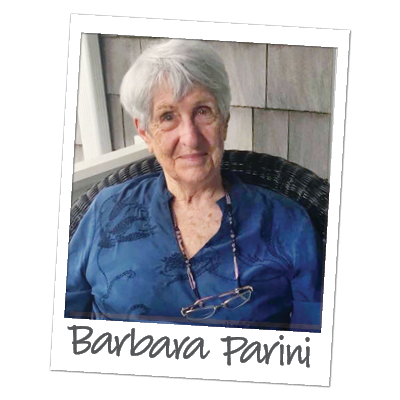Priesthood, Shelters and Hospice Care: A Life of Service for Barbara Parini
Barbara Parini, 92, an Ohio’s Hospice patient, has made an impact on communities she’s served across the country. Barbara was one of the first women to become an Episcopal priest in the United States. She served the LGBTQ+ community during the AIDS epidemic; ran a domestic shelter in the Hamptons, New York; and started a hospice program in Grand Rapids, Michigan.
Throughout her career, Barbara served in churches in Grand Rapids, Michigan; Boston, Massachusetts; Long Island, New York; and Naples, Florida.
“Her spiritual work began early in her life, however access to clergy as a woman was limited until the 1960s,” said Gregg Parini, Barbara’s son. “She felt drawn to the church and initially started to pursue the diaconate to become a deacon in the Episcopal church. During that experience, she found herself called to be something more and with a supportive diocese in Michigan, went on to pursue being a priest.”
Barbara attended Virginia Theological Seminary in Alexandria, Virginia, then returned to Michigan where she was ordained in the Western Diocese of Michigan.


Through her career with the church, she worked extensively with the LGBTQ+ community and worked on one of the first AIDS wings in a hospital in Boston. HIV/AIDS was once a dreaded and imminently terminal diagnosis. Hospice care and the AIDS epidemic shared a parallel history in the United States. Hospice care grew across the United States in the 1980s in part out of necessity. During those years, hospices in American cities were filled with young men dying from AIDS.
It was work by early hospice advocates that bonded them with victims of AIDS, as they offered symptom relief, comfort and emotional support when they could not offer a cure. Over subsequent decades, thanks to activism and advances in treatment, HIV infection is no longer the rapidly progressive, terminal illness that it once was in the United States. Treatment now enables patients to live much longer.
“The time she spent working in Boston had a profound impact on her ministry, especially those who were marginalized in the community,” Gregg said. “She was drawn to help those communities and did a lot of work with single mothers as well.”
In addition to her work with AIDS patients that found themselves battling a terminal illness and often rejected by their families, Barbara began to serve at a domestic women’s shelter in the Hamptons, New York.
“As a female priest, she felt women were drawn to her and more comfortable speaking to her as another woman who they could share their stories with,” said Alice Parini, Barbara’s daughter-in-law. “She was one of few women doing the work in a traditional patriarchal church.”
While in Grand Rapids, Michigan, in the 1970s, the Parini family lived in a neighborhood where neighbors were friendly with one another and cared for each other. When one fellow mother was diagnosed with terminal cancer, Barbara cared for her and noticed there was a support gap in the community.
“She took it upon herself to fill that gap and reached out to other hospice organizations to learn more about them,” Gregg said. “She worked with physicians and recruited the right knowledge resources to rally around the idea of hospice and supporting families.”
Gregg added that the neighborhood family Barbara cared for is still in touch with them, and one of the sons visited her recently.
“They revisited the whole moment and her care for them,” Gregg said. “It all dovetails with her spiritual tendencies and call to help those around her.”
From women’s shelters to hospice, Barbara had a profound impact on a variety of people throughout her life.
“Up until her 90s when she had a resurgence of cancer, she had a community she was ministering to and provided support for people who really needed it,” Gregg said. “My mom has always provided a positive role model not only for the communities she served but for our family as well.”
We’re honored and privileged to provide compassionate care to Barbara.

